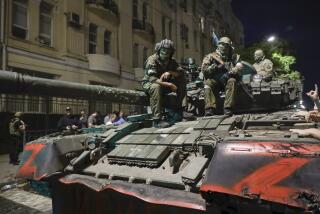Ansar Fighters Surrender to Kurds
- Share via
QAYARFARY, Iraq — Denied entry into neighboring Iran, scores of Islamic militants who had retreated into the mountains during recent attacks by U.S. forces are trudging through snow and across fields to surrender to Kurdish fighters in northern Iraq.
The Ansar al Islam guerrillas are considered terrorists, would-be suicide bombers with alleged ties to Al Qaeda. But as 15 of them sat in the dimness of a cinderblock house here Sunday, some with frostbitten toes and shaved beards, they seemed more misguided and scared than dangerous.
Some are boys. Others said they had never fired at an enemy.
As they surrendered, their weapons were seized, their watches and combs confiscated. And in their cracked and muddy shoes, they were put on a bus and shipped to jail.
More than 300 Ansar guerrillas have agreed to surrender in the coming days to the Kurdish government, according to Abdullah Haji Mahmood, a commander in the Kurdish Socialist Party who negotiated the deal. Among them are Ansar leaders, including Abdulah Shafee, Mohammad Hassan and a man identified as Dr. Omer.
Ansar fighters were defeated in a two-day battle last month when U.S. Special Forces troops and 6,000 Kurdish fighters attacked their strongholds along the Iranian border. About 250 of Ansar’s 700 fighters were killed; others fled over the mountains and sought refuge in Iran.
But Kurdish officials said Iran has played a crucial role in squeezing Ansar militants by preventing them from crossing the border, even for medical treatment. Although the Kurds have been asking Tehran to help isolate Ansar for months, Iran acted only after quiet U.S. intervention, through secret talks and diplomatic messages via Swiss diplomats, a ranking Kurdish official said Sunday.
“Iran is pushing back Kurdish members of Ansar,” the official said. “Iran even refused to help the wounded. Perhaps the Iranians understand English better than Kurdish.”
Other Kurdish officials, however, said the Iranians are still holding a number of Ansar’s leaders, including bomb maker Ayub Afghan and Hemin Benishari, who allegedly specialized in military tactics and assassinations. And Kurdish authorities are investigating whether Iran gave Arabs who belonged to Ansar safe passage to a third country.
Although made up largely of radical Kurds, Ansar had an estimated 120 hard-core Arab fighters from Yemen, Morocco, Israel, Tunisia and other countries. A number of them reportedly trained in Al Qaeda’s camps in Afghanistan, and Washington alleges that Ansar manufactured chemical agents and was a terrorist bridge between the Middle East and Europe.
Many of the Ansar fighters who have surrendered, however, “are different from Osama bin Laden and Al Qaeda,” said Mahmood, whose men guarded and fed the guerrillas until they were taken to prison.
“Most of them are brainwashed youths,” he said. “We believe they have been cheated and deceived and don’t really believe what Ansar teaches.... We have two options: to forgive them or kill them. If we kill them, we will be no better than them.”
Younger fighters not involved in killings will be released to their families after “elaborate security checks,” said Barham Salih, prime minister of the Patriotic Union of Kurdistan, which governs the eastern half of the Kurdish enclave in northern Iraq. “We will investigate. This is not about vengeance. It’s about justice.”
Many of the surrendering Ansar fighters were housed for several days at a military camp in Dizli, about three miles inside the Iranian border. They were then taken to the border and forced back into Iraq. Hiding in Dollaraw Valley near the city of Halabja, they made plans to surrender.
Samad Latif, 15, was one of them. He sat in a safe house Sunday, with matted black hair, rough hands and two frostbitten toes. The other guerrillas around him were older.
Latif said he left his home in Irbil, boarded a bus and joined Ansar on March 7. His weapons training consisted of firing nine bullets from a Kalashnikov. He was forced to change his name.
“I liked my name, Samad,” he said, “but it is not an Islamic name and they gave me a nickname, Abdul Razaq.... I read about Ansar in a pamphlet called ‘How to Make Jihad.’ It says if you spend one night in Ansar’s garden, it will be like 100 days of normal life and it will give you access to heaven. I said, ‘I came to make jihad.’ ”
Like the other guerrillas interviewed, Nasir Ahmed Mohammed said he never killed anyone, or even fired a gun at the enemy. He said he joined Ansar in December 2001, when his spiritual leader, Mullah Krekar, formed the group with about 300 fighters. Mohammed said he was a clerk in the logistics division at Ansar’s military headquarters in Biyara.
“I was in administration,” he said, adding that he was not privy to Ansar’s military tactics, such as suicide bombings. “I was not allowed to go into the military rooms.... Ansar is not a terrorist group.”
When asked what he thought about America, Mohammed paused, looked down and said: “I won’t answer that question.”
*
Times staff writer Robin Wright contributed to this report.
More to Read
Sign up for Essential California
The most important California stories and recommendations in your inbox every morning.
You may occasionally receive promotional content from the Los Angeles Times.














